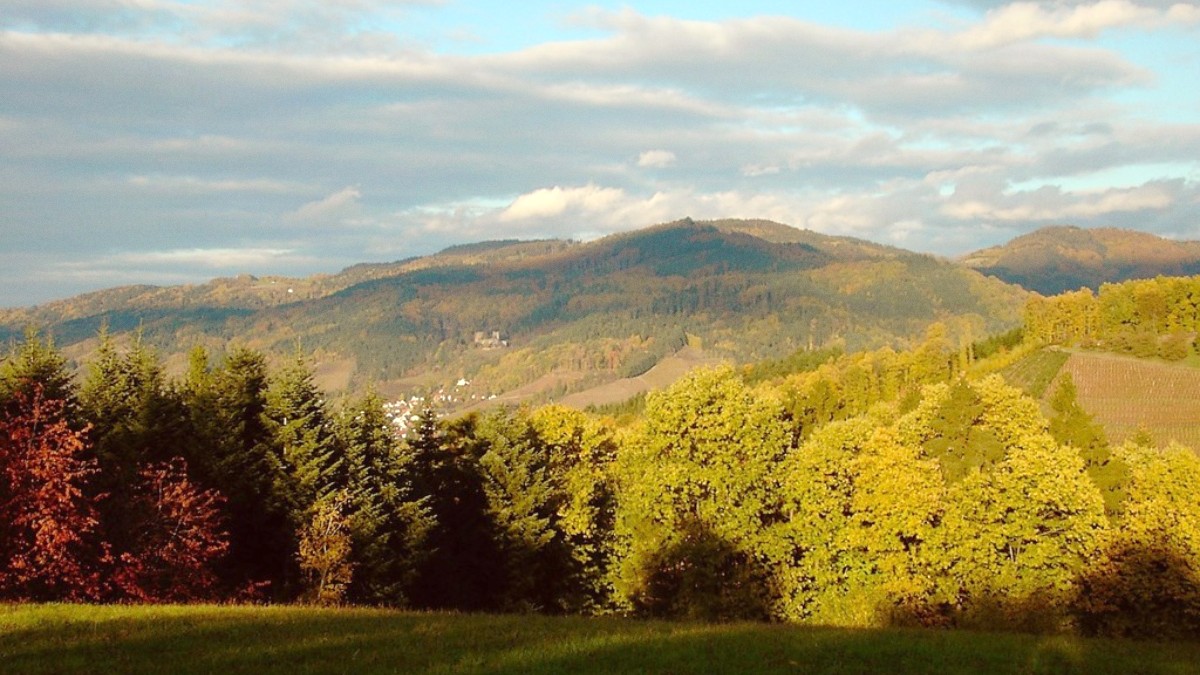
Black Forest, Germany
The Baden region is historically a fertile agricultural area, benefiting from a mild climate. This led to a cuisine utilizing fresh, seasonal produce, high-quality meats, and local dairy products.
Strong historical ties to Alsace across the Rhine mean dishes like Flammkuchen are as common in Freiburg as in Strasbourg or Colmar. The influence of wine production is also significant, with local wines often accompanying meals.
Traditionally, lunch is the main hot meal of the day in Germany. Many people eat between 12:00 PM and 2:00 PM. Restaurants often present "Mittagsmenü" (lunch menus) during these hours, for good value.
Dinner is often a lighter meal, sometimes consisting of cold cuts, bread, and cheese ("Abendbrot" meaning "evening bread"). Most restaurants serve full hot dinners, especially for tourists.
Bread is typically served with meals. Tipping guidelines are in section 2.3; rounding up or adding 5-10% for good service is customary. Ordering drinks before food is common. Punctuality is expected for reservations.
This iconic dessert originates from the region. It features layers of rich chocolate sponge cake, generous amounts of whipped cream, sour cherries, and Kirschwasser (cherry brandy).
A recipe book like Black Forest Cake: Authentic Recipe guides home creation.
A hearty and comforting dish, Käsespätzle consists of soft egg noodles (Spätzle) tossed with melted cheese, typically Emmentaler or Bergkäse, and topped with crispy fried onions.
It serves as a satisfying main course or a substantial side dish.
These are large, square-shaped German dumplings, similar to oversized ravioli. Traditionally, they are filled with a flavorful mixture of spiced meat, smoked ham, spinach, and bread. Maultaschen can be served in a clear broth or pan-fried with onions.
A specialty of Swabian cuisine, popular in the Baden region.
A popular apple pastry, often served warm with vanilla sauce or vanilla ice cream. A common and beloved dessert.
A dry-cured, smoked ham, protected by a geographical indication. It has a distinct smoky flavor and firm texture. You can buy it sliced from delis and supermarkets, or as a souvenir Black Forest Ham.
Freiburg features several highly-rated restaurants, some recognized by prestigious guides like Michelin. These establishments present contemporary German cuisine, often with regional ingredients, or high-quality international dishes.
Numerous "Gasthäuser" (traditional inns) and "Brauereigaststätten" (brewery restaurants) form the backbone of Freiburg's mid-range dining scene. These places include hearty regional dishes in a relaxed, often rustic setting.
Freiburg presents many options for affordable and quick meals. These are perfect for a casual bite while exploring the city.
This is a must-visit. Open daily (except Sunday), the market surrounds the Minster and presents a wide array of fresh local produce, seasonal fruits, cheeses, artisan bread, flowers, and prepared foods.
You discover local specialties and ingredients here.
An indoor food court located in the city center. It features various international food stalls, presenting cuisines from around the world (e.g., Asian, Italian, Middle Eastern).
A good option for groups with diverse tastes, as everyone chooses their own meal.
Trattorias and pizzerias
Chinese, Japanese, Thai, Vietnamese
Kebabs and more
Variety for various tastes
Dedicated Halal or Kosher restaurants are limited in Freiburg. If this is a dietary consideration, research specific establishments in advance of your trip.
Planning ahead is advisable for specific needs.
Some larger supermarkets might stock certified Halal or Kosher products, but their availability is less widespread than conventional items.
Check major supermarket chains for specific products.
Conduct online searches for "vegan Freiburg," "glutenfrei Freiburg," or "vegetarian Freiburg" to find specific restaurant lists, reviews, and forums.
For self-catering, major supermarkets like EDEKA, Rewe, and discount chains like Aldi and Lidl present a good selection of allergen-free products, organic foods, and fresh produce.
Discover local cooking classes that focus on Badische cuisine. These present a hands-on experience, teaching preparation of traditional dishes like Spätzle or Maultaschen.
Food tours, especially those centered around the Münsterplatz market, present insightful experiences. A knowledgeable guide introduces local producers, specialties, and culinary traditions, often with tastings.
In the surrounding Black Forest and nearby wine regions, opportunities exist for visiting farms, dairies, and artisan food producers. Some wineries present tours and tastings, learning about wine production directly from the source.
Restaurants on the Schlossberg (Castle Hill), accessible by funicular, present stunning panoramic views of the city. Dining with such a vista is a memorable experience.
Enjoy a meal with breathtaking city views.
Visiting a local brewery restaurant, like Ganter Brauerei, permits enjoyment of freshly brewed beer paired with hearty German dishes in a traditional setting.
This brings insight into Germany's beer culture alongside its food.
In the wine regions around Freiburg, these temporary wine taverns (often open only a few weeks a year) are run by winemakers.
They serve their own wine with simple, traditional dishes like Winzerteller (winemaker's plate with cold cuts and cheese).
This brings an authentic, seasonal dining experience, a direct connection to local wine culture.
Punctuality for reservations is valued, and bread usually accompanies meals.